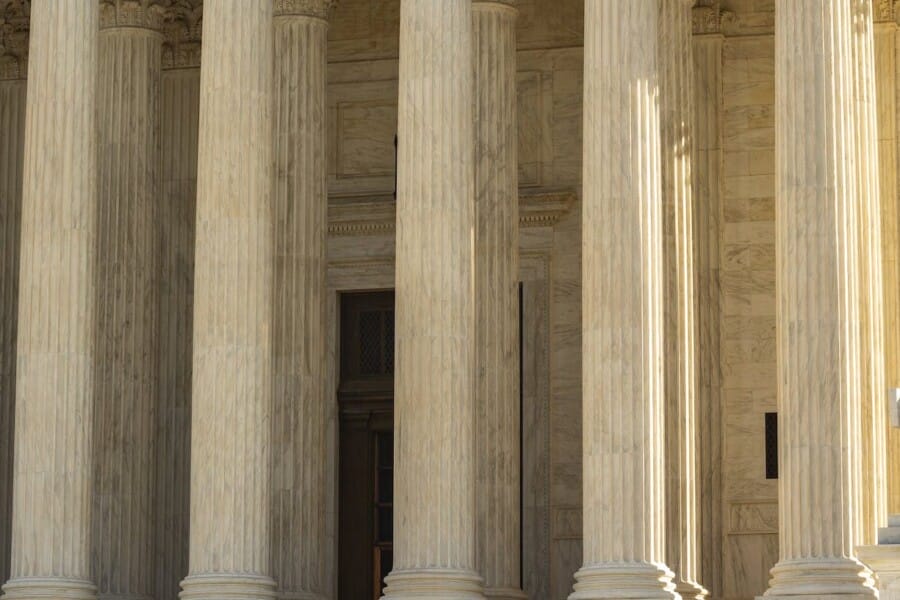President Trump’s nominee for the Supreme Court, Judge Amy Coney Barrett, was reported favorably out of the Senate Judiciary Committee early this morning. No last-minute bombshell came from the pages of the New York Times this week. There were no hostile protests in the hearing room, no long-winded statements in opposition. Every Democrat member of the committee boycotted the meeting, leaving behind themselves not empty chairs, but enormous full-color avatars of constituents they say were helped by the Affordable Care Act. Texas Republican John Cornyn called the scene in the meeting room “surreal”, and he chided the Democrats for boycotting “one of the most important votes we’ll ever have in our Senate tenure.”
With the Democrats AWOL, the Judiciary Committee needed twelve senators for a quorum, and every one of the twelve Republican members was in his or her chair this morning. Chairman Lindsey Graham (R-SC) fast-tracked the meeting, putting by the boards the usual concluding statements by each member. At 9:12 am, Graham called the roll, and every Republican member voted “Aye”, while silence followed the chairman’s intoning of every Democrat member’s name. History, which habitually reduces complexities to reductions, will record that her recommendation was unanimous, by a vote of 12-0.
The Democrats boycotted the meeting on the strength of their position that Republican efforts to confirm Barrett before the national elections made the proceeding hypocritical from the beginning. They have repeatedly held up the Senate’s refusal to consider D.C. Circuit Court Judge Merrick Garland’s nomination by President Barack Obama as an example of Republican duplicity. But as AUL scholar Clark Forsythe explains, Senate leadership is actually proceeding by an even-handed rule.
And historically, Democrat attempts to “Bork” Republican Supreme Court nominees have had mixed results, at best. It worked the first time – at the hands of now-Democrat presidential nominee Joe Biden – with the derailment of Judge Robert Bork, who was perhaps the single most qualified legal giant to be nominated for the Court in the Twentieth Century. The substitute nominee was Anthony Kennedy, who became a lion of some liberal causes. It could be that their partial success emboldened Democrats to viciously “Bork” highly qualified Republican nominees such as Justice Clarence Thomas, Justice Sam Alito and Judge Miguel Estrada’s nomination to the D.C. Court of Appeals. But Democrats would do well to count the cost of these flash-bang tactics. More recently, last-minute allegations against Justice Brett Kavanaugh failed to derail his nomination, but did cast the Senate minority in such a bad light that Republicans picked up two additional Senate seats in the 2018 mid-term election. It could well be said that the lack of gas in the Minority’s tank for vociferous opposition to Barrett is their own past historionics redounding to their hurt. Mike Lee (R-UT) took the occasion this morning to remind the nation of this sordid record, castigating Democrats for “decades of vicious, unilateral escalation” against Republican Supreme Court nominees. “We don’t need to confirm Amy Barrett to avenge those judges… not to give power to conservative judges but to give it back to the American people.” Senate Democrats may have finally been chastened with such an able and impressive nominee as Judge Barrett. Judiciary Committee Minority Leader Dianne Feinstein (D-CA) concluded the committee’s hearings on Barrett by embracing Chairman Graham, declaring her nomination “one of the best hearings I’ve participated in.”
And so it ends, except for the formality of a cloture vote this weekend and an expected floor vote in Barrett’s favor on Monday. Senate Majority Leader Mitch McConnell (R-KY) will keep the Senate in session through the weekend to finish the work, so that members of his party who are facing re-election campaigns can get home early next week for the final sprint to November 3rd. Senate Democrats have chosen an Instagram moment over substantive political engagement – a whimper instead of the flash-bang tactics of past Supreme Court nomination proceedings. The boycott – like the walkout they conducted after the committee’s approval of Justice Brett Kavanaugh – may have been less combustive than past antics, but it was not more high-minded. One can only hope that future nomination proceedings are better models of civility.



